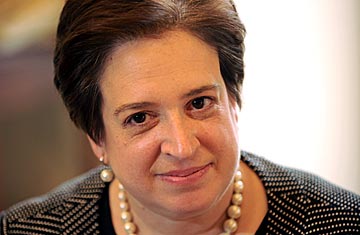
Supreme Court nominee Elena Kagan
Solicitor General Elena Kagan will be the center of Washington's attention this week at her confirmation hearings to become the 112th Supreme Court Justice. She is President Obama's nominee to take the seat of retiring Justice John Paul Stevens, one of the more liberal voices on the court. At her hearings, liberals will seek assurance that she is truly one of their own, while conservatives will test whether she's acceptably within their definition of the mainstream. Thus far, her candidacy has been a bit of a bore; a recent poll found that 42% of Americans had no opinion on whether Kagan should be confirmed. And confirmation hearings tend to be so stage-managed these days that Kagan herself once called them exercises in "vacuity and farce." But as Clarence Thomas learned, there is always the potential for them to turn ugly fast.
In recent weeks, Republicans have hardened their rhetoric on Kagan. Senate minority leader Mitch McConnell said two weeks ago that he wasn't ruling out a filibuster. Conservatives are arguing that too much of Kagan's career has been in politics. If confirmed, she would be the first Justice in nearly 40 years who has no experience on the bench. Thus there is little known about Kagan; her lack of judicial experience also means a lack of decisions through which her judicial philosophy might be gleaned. Her six academic papers, the memos she wrote while clerking for Supreme Court Justice Thurgood Marshall, the reams of e-mails sent during her tenure as deputy counsel and adviser for domestic policy in the Clinton Administration and, perhaps most important, her confirmation hearings to be Solicitor General offer some clues. But Kagan enters her hearing on Monday a bigger mystery than nearly any other nominee in the past 30 years. Here are five hot topics she will surely be grilled on as Senators try to get to know her better:
1. Gun Rights
Enough has emerged from Kagan's papers to make the National Rifle Association (NRA) nervous. As a clerk for Marshall, Kagan wrote that she was "not sympathetic" to a constitutional challenge of Washington, D.C.,'s gun-control law, which the court overturned in 2008 in D.C. v. Heller. In her confirmation hearings to be Solicitor General, Kagan reversed herself, saying she would uphold D.C. v. Heller, calling the decision "settled law." Still, Senators are likely to take D.C. v. Heller a step further and ask her about McDonald v. City of Chicago, a case the Supreme Court decided on Monday that overturned Chicago's ban on handguns and established that the Second Amendment right to bear arms applies to state and local gun-control laws.
Kagan will also face questions about a paper she wrote in the Clinton Administration that paved the way for an Executive Order banning dozens of semiautomatic weapons, though the White House argues that she was simply acting as counsel and giving advice, not creating policy. Another two memos found in Kagan's papers related to the Volunteer Protection Act, which, when it passed, shielded some nonprofits' volunteer workers from tort liability in certain cases. In those memos, the Clinton Administration worried that "bad guy orgs" such as the NRA and the Ku Klux Klan might also benefit from the law, though it's unclear if these were Kagan's words or an aide's, as the memo is unsigned.
2. Wise Jew?
During her confirmation hearings, Justice Sonia Sotomayor was grilled for saying that she'd like to see diversity on the court and would rather hear from a "wise Latina" than another bland white guy. Sotomayor was confirmed to be the third woman on the court last year. Kagan seeks to become the fourth woman and the eighth Jew on the court. There is much debate about what Obama has labeled the "empathy" standard, or how much Justices should be swayed by modern circumstance. Many conservatives contend that all judges should interpret the Constitution according to the founders' intent and that their personal backgrounds should be irrelevant to this pursuit. As Chief Justice John Roberts put it in his confirmation hearings, "It's my job to call balls and strikes and not to pitch or bat." In her master's thesis at Oxford University, Kagan seemed to agree with Sotomayor. "As men and as participants in American life, judges will have opinions, prejudices, values," Kagan wrote. "Perhaps most important, judges will have goals. And because this is so, judges will often try to mold and steer the law in order to promote certain ethical values and achieve certain social ends. Such activity is not necessarily wrong or invalid."
Kagan later lamented that she was just a "dumb" kid when she wrote that thesis. And at her confirmation hearings to be Solicitor General she wrote, "It is a great deal better for the elected branches to take the lead in creating a more just society than for the courts to do so."
